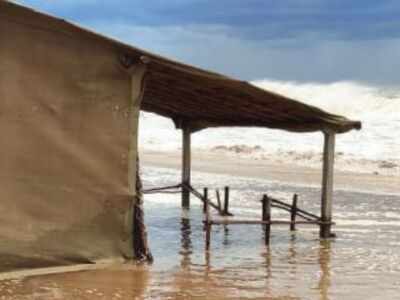Goa: Cyclone abruptly ends turtle nesting season at Canacona

Some hatchlings were lost due to rise in water levels on the beach
POINGUINIM: Although the Olive Ridley turtle nesting season was brought to an abrupt end due to the impact of Cyclone Tauktae, the Canacona forest department is upbeat as it managed to release 3,254 hatchlings into the sea from 32 nesting pits at Agonda and four at Galgibaga before the cyclone struck.
Range forest officer in-charge Anant Velip told TOI that the turtles visited Agonda beach 35 times and Galgibaga four times this season, but that the cyclone ruined three nesting pits at Agonda, prompting the forest department to save 3,080 hatchlings.
Also, while the eggs in the four pits at Galgibaga had hatched, just 174 hatchlings could be retrieved. Others were lost due to a possible rise in water levels on the beach, Velip said.
The protected nesting site at Galgibaga has been a concern of late, as only four turtle nests were protected here this season. The nests carried 435 eggs of which 174 hatchlings were released into the sea.
Tourist inflow and noisy surroundings are also believed to be affecting and endangering eggs, as a result of which many eggs were shifted to the forest department’s interpretation centre for protection during the incubation period.
To protect the area under incubation, the forest department employed locals to keep a close watch round-the-clock to deter people or stray dogs from interfering with the eggs. ‘No development zones’ have been put in place on beaches by the local authorities along with stricter regulations on building of beach structures, said Velip.
Considering the need to protect the endangered Olive Ridley turtles, the government has taken up the conservation programme and the forest department has fenced the coastal area at Galgibaga to ensure proper protection to the turtles.
Officials insist that protection measures are needed as unchecked tourism activities in the area could prove detrimental to the safety of turtles arriving to the shore to lay eggs.
Range forest officer in-charge Anant Velip told TOI that the turtles visited Agonda beach 35 times and Galgibaga four times this season, but that the cyclone ruined three nesting pits at Agonda, prompting the forest department to save 3,080 hatchlings.
Also, while the eggs in the four pits at Galgibaga had hatched, just 174 hatchlings could be retrieved. Others were lost due to a possible rise in water levels on the beach, Velip said.
The protected nesting site at Galgibaga has been a concern of late, as only four turtle nests were protected here this season. The nests carried 435 eggs of which 174 hatchlings were released into the sea.
Tourist inflow and noisy surroundings are also believed to be affecting and endangering eggs, as a result of which many eggs were shifted to the forest department’s interpretation centre for protection during the incubation period.
To protect the area under incubation, the forest department employed locals to keep a close watch round-the-clock to deter people or stray dogs from interfering with the eggs. ‘No development zones’ have been put in place on beaches by the local authorities along with stricter regulations on building of beach structures, said Velip.
Considering the need to protect the endangered Olive Ridley turtles, the government has taken up the conservation programme and the forest department has fenced the coastal area at Galgibaga to ensure proper protection to the turtles.
Officials insist that protection measures are needed as unchecked tourism activities in the area could prove detrimental to the safety of turtles arriving to the shore to lay eggs.
FacebookTwitterLinkedinEMail
end of article
Top Stories Right Now
- indiaCovid-19 cases in less than 2% of population, 98% still vulnerable, says govt
- cityKarnataka overtakes Delhi, has 2nd highest Covid toll
- indiaCovid live: Sudan bans travellers from India
- india24 days in Russia plus 2 Sputnik V shots for Rs 1.3 lakh
- cityCyclone Tauktae live: PM Modi to visit Gujarat, Diu to review situation, damage
Quick Links
Delhi Air PollutionDelhi TemperatureChennai WeatherBangalore TemperatureCovid vaccination centres in DelhiCoronavirus in DelhiRTPCR test in GurgaonHyderabad RainPollution level in BangaloreDelhi SmogDelhi TemperatureNoida AQIGurgaon AQI todayFire in MumbaiMumbai RainsCovid 19 RT PCR Test in NoidaDelhi AQI todaySrinagar encounter
